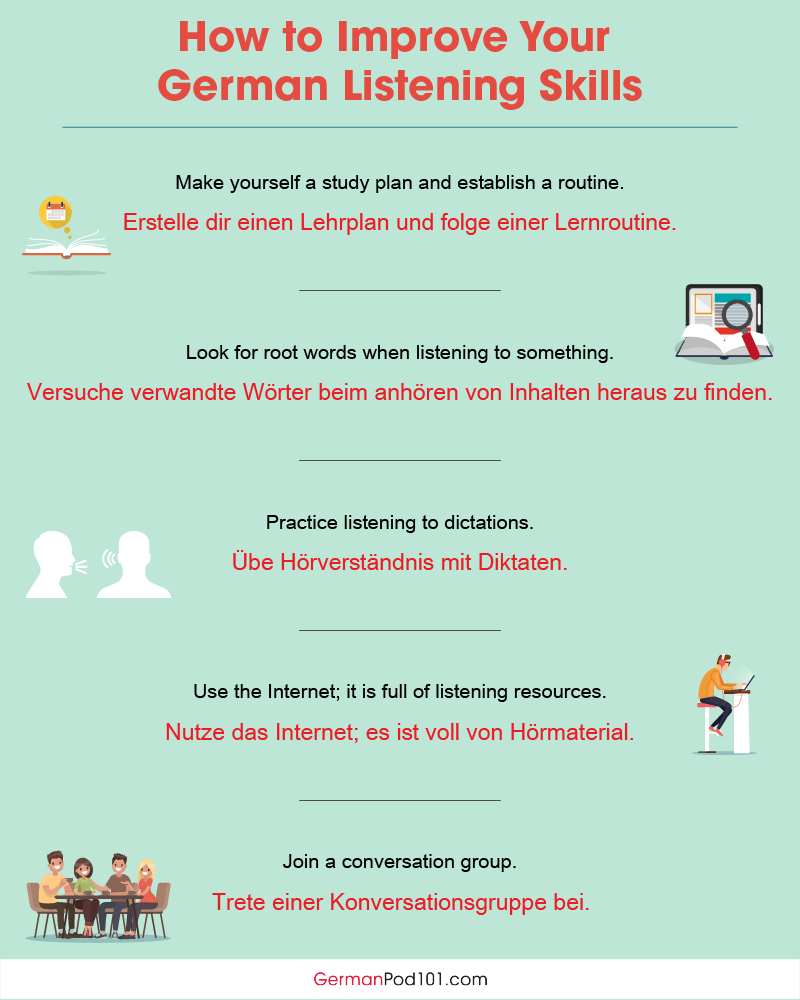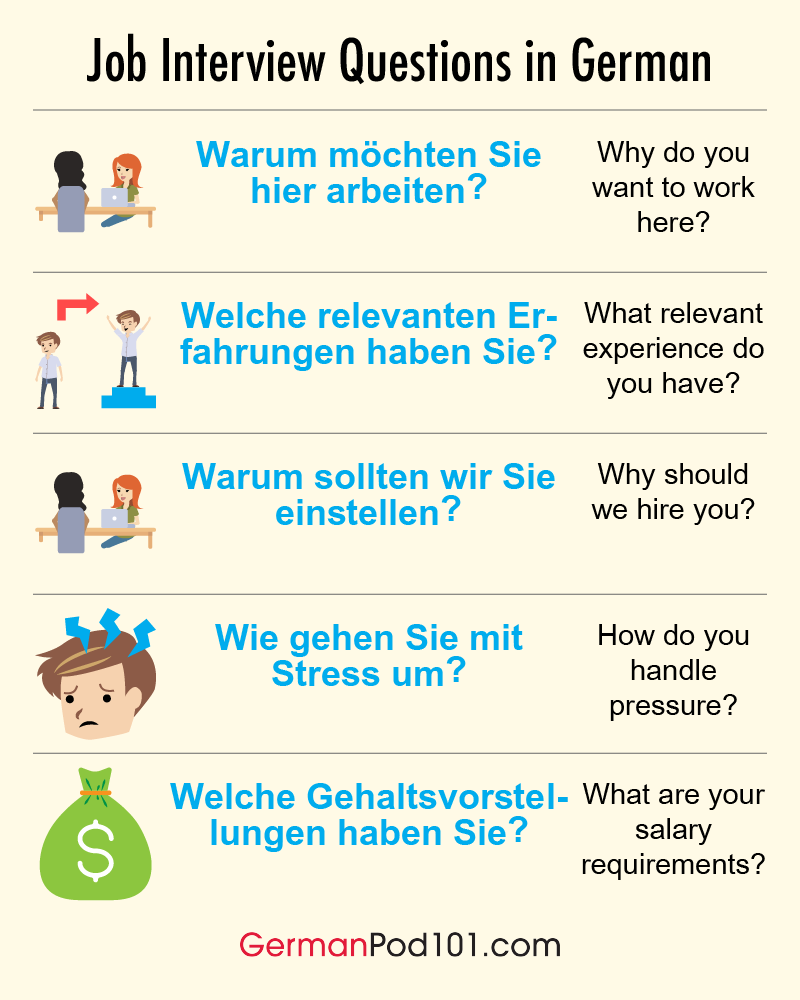
Have you ever heard about the Italian people using their hands, feet, and all the other parts of their body while they’re talking? Your answer is: Yes?
No worries if you haven’t heard this about German people. The only reason for this is that we’re not that expressive with our body gestures and body language like other nations are. But have you heard about German eye contact? They like to keep eye contact at all times.
Here’s a little side story to help you visualize nonverbal communication in German:
My grandparents travelled in Africa for three months in 2012. Does that sound odd? It gets better! My grandparents don’t speak any French or English at all. All they know is German.
After they came back home, I was impressed and asked them how they expressed themselves to the locals. The dry answer my grandmother gave was: ‘Boy, with our hands and feet.’ This is a common German idiom.
All I want to show you is that body language is such a significant part of our daily life. When you master the common expressions in German, your interaction with locals will improve immediately.
Body language isn’t often covered by German language teachers. Learning some basic principles and gestures will help you right from the start. Maybe some of these postures are already familiar with you if you’re coming from a neighboring country.
I hope I made my point clear and that now you know why body gestures in learning German
are important for your progress. Here we prepared for you some of the most common German gestures in as simple a way as possible.
However, if you’re interested in improving your speaking skills, here’s a helpful vocabulary list.
In the meantime, let’s get on to learning common body language and gestures in Germany!
Table of Contents
- Zählen
- Greetings
- Positive Gestures
- Negative Gestures
- Other Gestures
- Why are Germans Heartless and Why is Eye Contact Important?
- How GermanPod101.com can Help You Learn Faster

1. Zählen
| Meaning: | Counting (One, two, three, four, five) |
| How: | Thumb is one, thumb and index finger is two, thumb and index finger and middle finger is three, and so on. |
| When: | Basically, we use this the same way as people in other nations do, but just in a different way. A good example would be when ordering a drink in a bar where the music is loud, and you want to signal how many drinks you would like to have. Be careful here. When raising just your index finger, the barkeeper might give you two, because he misinterpreted your gesture. |
There are different ways of doing this. This is just the way we in Germany do it, and it’s one of the most common hand signs in German.
Here’s a helpful lesson for counting in German.
2. Greetings
When learning body language in Germany, it’s vital that you know about greetings. These German body gestures will help you say “hello” like a native, without even saying a word.
1- Die Hand geben
| Meaning: | To shake hands |
| How: | German handshakes are firm, with or without up and down movements, while looking the other person straight in the eyes. |
| When: | There are some situations when you should give a handshake instead of a hug (or any other greeting):
There are some exceptions to these rules, but we won’t go much deeper into it for now. |
Okay everybody, let’s get prepared for the handshake in Germany. I know people from other countries find this part about the German culture a bit boring, but it is how it is. We’re a nation of hand-shakers. This might sound a bit awkward to people from South America, France, or any other country that are used to giving hugs for greetings.
But we just don’t do it in general. Even when you’ve known a person for a long time, you’re not going to just fall into their arms as a greeting.
2- Bussi Bussi
| Meaning: | A more romantic way to say hello. |
| How: | Lean forward and slightly touch cheeks while mimicking a kiss. This isn’t like in other countries where they do two or more kisses; in Germany, one is more than enough. |
| When: | This form of greeting is most common when you greet your female friends, your parents, or your close family members. |
3- Hallo
| Meaning: | Hello |
| How: | Raise your hand and swing it from side to side. |
| When: | You can use this in almost any informal situation. This might be a bit too casual for business meetings, though! This is a great substitute if you want to greet more than one person. |
If you’re ready to dive a bit deeper into how to say “hello” in German and introduce yourself, take a look at this video. Or if you’re looking for another approach to underline your gestures with words, take a look at all German words for greetings.
Greetings are not everything, though, so you may want to brush up on how to say goodbye in German as well.
3. Positive Gestures
1- Daumen hoch
| Meaning: | Thumbs up / Perfect / Excellent |
| How: | Make your hand into a fist and extend your thumb upward. |
| When: | This isn’t only a way to show the number one in German, but also a universal hand gesture for showing that everything is okay or perfect. Be cautious when using the thumbs up, as someone might think that you’re counting. But in general, people understand that you’re signing “perfect” or “okay” when doing this gesture. |
2- Daumendrücken
| Meaning: | Pressing your thumbs for good luck. / Fingers crossed. / To wish someone luck. |
| How: | Make a fist and hide your thumbs inside of your fist. |
| When: | This is always used in this form in a sentence: Ich drücke dir die Daumen or “My thumbs are pressed for you.” This just means that you wish someone luck for an upcoming event. This might be an exam, a sports competition, or a date. |
4. Negative Gestures
1- Jemandem den Vogel zeigen
| Meaning: | To show someone the bird. / To say that someone is crazy. / Tap temple to communicate that a person is crazy. |
| How: | Tap your forehead or temple with your finger. |
| When: | This is similar to the American crazy gesture which in Germany everybody would understand too. This isn’t a formal gesture and is offensive. Don’t do this to everybody; it might be okay with friends as a sarcastic gesture. |
2- Waving your hand in front of your face.
| Meaning: | When waving your hand in front of your face, you want to signalize that something is insane. (It can also mean, “You’ve got to be kidding me.”) |
| How: | Hold your hand flat and use it to wave a couple of times from the left to the right, in front of your face. |
| When: | You can use this in any situation where you think something isn’t appropriate. For example, you see your friend jumping from a high point into the water or someone’s telling you a story that sounds just too crazy to be true. |
3- Daumen runter
| Meaning: | Thumbs down. / Something is bad. |
| How: | Do the same gesture like thumbs up, just reversed so that your thumb is pointing downwards. |
| When: | Basically, you can use this gesture any time you dislike something. |
4- Forearm Jerk
| Meaning: | Go screw yourself. / Get off. |
| How: | You perform this gesture by making a fist with your right hand and bringing this arm up whilst slapping the upper part of your right arm with your left hand. |
| When: | In German, this is a rude gesture, but it’s known by almost everybody. You really shouldn’t use this with anyone. When you’re faced with this gesture, it may be better to leave the situation. This really is one of the most offensive German gestures. |
5. Other Gestures
1- Augenlied herunterziehen
| Meaning: | I mean this sarcastically. |
| How: | You pull your lower eyelid downwards with your index finger. |
| When: | You should do this gesture when you’re saying something sarcastically and you want to give it a small undertone. Here is a quick example: “My brother was not at school today due to his illness.” (Say this while pulling your eyelid down.) |
2- Ach
| Meaning: | Doesn’t matter. |
| How: | It’s done a bit more lightly than in our example, but it should still give you an idea of how it’s done. You just wave your hand once and combine it with the word Ach. |
| When: | There are, in fact, a couple of different situations where you can use this word. Mostly, we use it in combination with other words; it can also be used with or without the gesture. Based on these factors, it can have different meanings:
|
3- Tja
| Meaning: | Oh well. / I don’t care. / I don’t know. / I’m not sure. |
| How: | Spread your arms open with palms up. Raise and lower your shoulders. |
| When: | This actually refers to a wider range of emotions including thoughtfulness, concern, hesitation, embarrassment, and resignation. Some good examples for English translations:
|
6. Why are Germans Heartless and Why is Eye Contact Important?
1- Are Germans Heartless?
Maybe they’re not. There are some stereotypes out there about Germans that are true, but we’re not heartless at all. Though we do value things like order, privacy, and punctuality which can give the impression of being “heartless.”
Since we value privacy, it might seem like we don’t love the people around us, but that’s not true. We just don’t express ourselves as other nations do and we respect the privacy of others.
Those are important facts when dealing with a German. But no worries, no person from Germany will dislike you if you give him a nice and warm hug.
2- German Eye Contact
In Germany, it’s considered polite to maintain eye contact almost all the time while talking to another person. This is especially important during business meetings. Eye contact is a sign of attentiveness, and you don’t need to be afraid of threatening someone with this. It’s better to maintain eye contact than to overdo it with too many body gestures with German locals.
Here are some hard facts when it comes to eye contact with a German:
- It’s expected and respected.
- It demonstrates attention and awareness.
- It’s a part of proper etiquette.
And now a really important fact:
DO use eye contact while toasting in Germany. Or else you’ll have bad luck for the next seven years of your life.
7. How GermanPod101.com can Help You Learn Faster
When learning a language, especially when you’re at the beginning of this journey, people always say “Go to the country where they speak the language and you’ll master it.”
In my experience, this is good advice. But once you’re there and you start listening to the locals and you ask yourself if they even speak the same language that you’re trying to learn, this feels a bit tough. Here’s when body language comes into play, as it helps you understand the context and anticipate which words might have been used.
Whether you’re just up for a holiday in Germany, or are ready to dive completely into the German language and its nuances, the body gestures we showed you here are just the tip of the iceberg and there’s so much more to discover.
To get started, GermanPod101.com has a lot of free resources that you can use to practice and improve your grammar skills.
With our MyTeacher app, you can get one-on-one practice that perfectly fits your individual needs. With your private teacher, you’ll level up fast.
That said, we wish you the best of luck as you continue learning German and the many facets of its culture. We hope that you learned a lot about German body language and gestures. Be sure to keep practicing with GermanPod101.com! Start with a bonus, and download your FREE cheat sheet – How to Improve Your German Skills! (Logged-In Member Only)


































































































